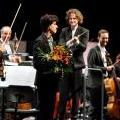Search the Community
Showing results for tags 'advice'.
-
Are there any techniques that are good for making a transition away from traditional notation software to more physical paper works, which is what I intended to do more of. so is there advice for being less dependent on technology and being able to write using just pen and paper. Any advice will do, thanks.
- 3 replies
-
- music
- manuscript
-
(and 3 more)
Tagged with:
-
Hello guys! I hope you are all well! I have a question about music composition for games, more specifically, background music. About the shape of the structure: What form is generally used in compositions of music games? Ternary, Rondo, Theme and Variations? About the melody: What style of melody is usually worked on? the system of motive and development as did Beethoven, or Wagner's endless melody? About contrast sections: Do background songs need to follow the same instrumentation from beginning to end?
- 5 replies
-
- techniques
- composition
-
(and 1 more)
Tagged with:
-
So, up until now I've mostly written in an overtly Classical style, and that was perfect style for me to learn and grow in over the years, owing to its relatively simple forms and my general preference for that era. However, I'm aware that writing in old styles is often perceived as stale, unoriginal and not innovative. And so we come to present day and I feel like I am in a place where I can be more creative and take risks, but I'm at a bit of a loss as to where to go from here? As I see it, I could stick with the Classical and continue to develop that, or I could try out later styles. I just don't see how or why either of those options is better or more valid than the other!? The reason I say that is, despite the general bias against the idea of modem composers writing in decidedly old styles, personally, I think there is still much to be said about the inherent value of the work in and of itself. If the Jupiter symphony was released now by someone instead of WAM, would its modernity be a flaw? Simply put, I think that music can be good, even if it lacks originality. The fact is, people enjoy these old styles that many of us write in, and I feel that is worth the effort. However, despite my own personal belief that these works in old styles still have value, I can't ignore the fact that many people don't value such works in the same way and ultimately, I'm sure we all want others to value our music. So, this all just leave me confused as to what i should do next. I've started to move away from strictly Classical works with the beginnings of a little nature series, but I'm already starting another Classical piece. However, now, I'm questioning the value of it all? What do you think? I'd welcome the perspective of all, those who are in similar positions but also those who aren't Best, Dan
-
I was wondering if someone could give some tips on what instruments to boost the bass range of an orchestra, currently I am using EWQLSO and am somewhat limited on the range of certain instruments. Also wondering if they could direct me towards which instruments play which clefs in soprano, alto, tenor, bass.
- 4 replies
-
- question
- arrangement
-
(and 8 more)
Tagged with:
-
Hi Young Composers, In my latest article, I discussed about why most modern game soundtracks are boring and lifeless and how to remedy it. And this has actually very little to do with composer's technical skill as most would think. Take a read and see if it make sense, or if you have encountered circumstances as discussed in the article. Also, it'll be helpful if composers(you guys!) in this forum can have a discussion if you agree with me or not. :) https://www.linkedin.com/pulse/why-most-modern-game-soundtracks-lifeless-marvel-symphonic-yoa/ Being an experienced composer/audio specialist for visual media with over 10+ years of experience and have worked on projects with over $85 million in the box office and multiple other award winning projects. I've worked with all kinds of people - both high and low, nice people and assholes. Through my personal experience, I know what's truly plaguing the industry and am offering my insights of how to improve it for the benefit of the community. Thanks and if you find this article helpful, do give it a like and share it to others :) -Kian Music Composer | Visual Media Audio Specialist www.kianhow.com
-
I was wondering if anybody could give me a little advice I was reading a Bela Bartok letter that he sent to an organization that had just gave him an award. The purpose of the letter that he sent was to correct the errors that the organization made 1. they got the date of the premier the piece wrong 2. why they chose him, incorrectly 3. they should have chosen Zoltan Kodaly 4. he would never accept the award ever, "dead or alive" My question is, should you accept an award for a piece of music of your own, just for the sake of it being your own work, or, should you not accept it, because it is not your best work, and recommend someone who deserves it?
-
Hi all, As the title says; I need some advice and / or tips with composing fast tempi compositions. In opposition to pieces with slow tempi, which I really like, the ones with fast tempi just sound flat, lack harmony and are not interesting at all... These fast tempi are in such a huge contrast qua quality and character with the slower tempi. I find it very hard to compose pieces that I do like myself. Help would be very appreciated! (I have attached two pieces for you, so that it is easier for you to give advice and to understand what I mean. Note that these pieces are not finished yet). Maarten
-
Hey, I just started composing a little while ago and was hoping to find some advice on a piece I'm working on. I would really appreciate advice on improving and developing the piece further. Thanks!!! Hopefully it's not too bad.
-
Hello all, I am currently in my final year of studying for my degree in Music Composition for Film and Media and I was hoping to get some advice on finding work as a composer. I am happy to work with any type of media but I find it difficult to believe that most composers just sit around and wait for directors to approach them with pieces of film requiring music. Are there any good websites to use where a composer can go and find work for himself? Should I be offering my services for free? Also are there any particularly effective ways of advertising oneself? Any advice on this matter would be greatly appreciated. Thanks for your time! Andrew
-
These are some things that I like to keep in mind while composing. I would like to get feedback on them. What do you think of them? Do you think they are good to keep in mind? Do you think there are problems with them? Is there something else that you think is good to think about? (I know it's long. Sorry about that.) There are three parts: big picture points, "small picture" (for lack of a better term) points, and creativity points. The big picture points have mainly to do with structure. I think of a piece like a play with act I, act 2, and act 3. The first act introduces the material which I think of as the characters. The second act "goes on an adventure." The characters do things. There are conflicts (tension) and they get resolved (released tension). The whole of act 2 has to have one general conflict that is bigger than all of the others and is introduced at the beginning of act 2 and resolved at the end of act 2. When that main conflict gets resolved, the piece goes into act 3 which is the conclusion. It should be climatic and "euphoric." It wraps up the piece by summarizing the material (all of the characters come together). It ends by leaving a sense of the entire essence of the piece in the listeners ear. We can represent the characters in the music with motifs. And we can represent their actions with melodies. The essence of the characters (the motifs) are moved by melodies (the bodies of the character). The melodies can move the motifs around in different ways to make the characters to do different things. Every character has a personality. They can share their general personality with something like a motto, or an action that tries to express their general essence. This is done with themes. A theme would be a melody that moves the motifs in a way that best bring them out. (I use motif loosely here: it can be more than just a simple melodic or rhythmic pattern, but it could be any small recognizable idea.) The introduction to the piece can best introduce the material by simply stating the themes (show off the characters' personalities to get the listener familiar with them before they go adventuring in act 2). In act 2, the characters do many different things. But just because the characters do different things doesn't make them different characters. Fundamentally they are the same character. The melodies can do all kinds of things while still containing the fundamental motifs. Act 3 is kind of like act 1. All of the characters get together and express their essence with themes. The themes pick at the listener's previous experiences with the characters in act 2 and sum them up. One thing I like to do in the ending of a piece is to find a way to harmonize all of the characters and have the melodies play on top of each other without changing them so much that it strays too far from the theme (sometimes I just compose the themes in the first place to be counterpoint-compatible with each other). It really unites them and gives that "euphoric" effect if done well. I like to imagine the structure of a piece in two dimensions: horizontally being time and vertically being counterpoint (in a generic use of the term). The three acts are ordered horizontally. A majority of the time will (probably) be spent on act 2. Vertically is all the different parts that are happening at a given time in the piece. It would be more abstract then real counterpoint, because counterpoint has to do with melodies. The different parts can be anything, whether it serves a melodic purpose, a rhythmic purpose, a texture purpose, a harmonic purpose, etc.. When these parts are layered, the listener's ear should be guided to a certain level. The parts can be anywhere on the line from being in the background to being in the foreground. The foreground is what the listener pays attention to at any given time (leads, etc.). The background still influences the listener, but is not necessarily in the conscious attention of the listener. The foreground is where the action should take place (the characters interacting and the story being told). The background is where the setting is established. That would include emotion (guided by harmonic progressions), intensity or energy level (guided by rhythm), and general feel of the setting (texture, timbre, etc.). Now, background elements aren't necessarily characters. For example, harmony doesn't exist on it's own, it is just a property that comes from the relationship of different parts playing simultaneously. So you could create harmony with simple absolute bass notes and the setting would get the emotional feel. But you can also have motifs in the background elements. This gives the setting more personality. Not all motifs have to represent foreground characters. They can represent settings as well. On the other hand, characters themselves can give personality to a setting by going into the background. If you have several melodies playing, you can phase different ones in and out of focus. The ones that aren't in focus contribute to the setting. There are three small picture points. They have to do with the content that goes into the framework provided by the big picture points. They are harmony, balance, and simplicity. Harmony is simply keeping in mind the harmony that is going on at the moment. Pretty much a no-brainer, but I like to keep it in mind. Balance has two parts: unity and diversity. You can say something is balanced when it has unity and an interesting amount of diversity. Imagine a bare white plane. This is unity without diversity. Every part of it is the same: unity. Now if we add a little dot in one corner, we have something different. Now we have a little diversity but no unity. We don't have unity because something strange has interrupted the perfect white plane. To fix it, we have to add a counter to the little dot. Perhaps, on the opposite side. This cancels out the disruption in unity, and unity is restored. That's how you get both unity and diversity and thus balance. Balance can apply in many ways on many levels. Structurally there needs to be balance. You don't want too much or too little excitement near the start or the end of the piece because it will sound out of place. This happens in the details as well. Rhythm should feel even overall (unity) but with interesting things happening in the gaps (diversity). The last one is simplicity. Don't put anything in that doesn't adequately accomplish a meaningful task. It can also mean elegance. Try to do do things efficiently. Music theory really helps with this kind of thing. That way you don't scrape your brain out trying to find the sound that has the purpose you are looking for. All of the above is an intellectual framework that lacks actual creative content. I find that to get the actual content, you have to do the opposite: not think. Creativity seems to diminish when you try to intellectualize it but seems to come out when you let it speak for itself. It's as if it's a different person than your self and you have to be quiet and let it talk. Just think about when you dream. You are asleep and not thinking. Nothing makes sense, but it is extremely creative. I often wake up and write down my dreams so that I can possibly incorporate the dream content into some kind of project of mine. The project puts an orderly framework around the creative chaos. To get the creative juices flowing, I usually listen to lots of music. Especially music that I haven't heard before, and I really pay attention to it. This puts a lot of new ideas on your mind. But because it's new and you only heard it once, you can't remember the pieces as the were. So it's hard to remember it the right way but easy to remember the wrong way. Remembering it the wrong way gives you your own creative ideas that are the result of chaotically trying to synthesize the small chunks that your brain was able to catch. All you have to do at this point is listen to the noise in your head. If you can't hear anything, then try to recall something and try to get it flowing. Once you get it flowing, you can start jotting down ideas that come to you. Once your piece gets started, and structures start appearing, the creative process becomes even easier because you aren't totally building music out of silence. You are now building it off of real music. These are the main points that I like to think about when I am composing. Comments? Thanks if you read all of this. It's long, I know. Sorry. :P
-
Hi, I need some advice on composing a new Melody. I´ve already made some orchestral songs that aren’t half bad. But now I have problems to think of a new Melody. In the moment, I can only think of similar ones to those I already made. When I think back, I can´t really remember how I got those melodies. So, I´m in a bit of a loss right now. How do you composite new songs and how do you put aside your last project? Do you meditate until you get something new or do you listen to other songs, to get some inspiration? (Isn´t that like changing an existing Song?) So, what are the pro´s ways of making something new? But this isn´t my only Problem. I said my songs weren’t half bad, but they lack emotions. I want to get my emotions into the song. But how? Every time I made a new melody, I couldn’t feel my own feelings in it. I admit, this will get me to the same question as before: So, how do you composite new melodies? I hope this isn´t asking too much. Looking forward to your answers Thank you in advance. Greets Memoria
-
So as many of you know, I am working on a recording project during my time away from school this spring semester. I am using kickstarter to raise funds to help finance the project and am currently working on setting up the fundraising page. As I am new to this sort of stuff, I figured it'd be best to seek advice on how best to market the project to potential donors. The project's idea is the recording of several solo and small chamber works of mine (some written/others unwritten at this time). Once recordings have been made, the works will be presented on my youtube channel and made into a cd for promotion. What is the best way to market this idea? Any ideas? Tips? Suggestions?
-
hello! Can you give me advices on writing for harp... and if you have some time please check this harp part and comment http://www.youngcomposers.com/music/1336/a-naked-lunch-suite-help-on-harp-part/ can someone help me please...! Thank you










